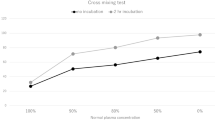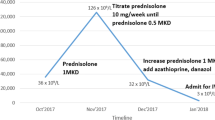Abstract
Although the incidence of autoimmune hemorrhaphilia due to anti-Factor XIII (FXIII, not FVIII or FXII to avoid confusion) antibodies (AH13) or hemorrhagic “acquired FXIII deficiency due to anti-FXIII autoantibodies” was previously considered rare, it has been on the increase in the twenty-first century, at least in Japan. An 83-year-old woman with an unexplained hemorrhage was admitted to our hospital for intramuscular hematoma and severe anemia. Her FXIII activity was reduced to 10 % of normal; since FXIII inhibitors and anti-FXIII-A subunit autoantibodies were detected, she was definitively diagnosed with AH13. Despite developing cardiac tamponade due to pericardial hemorrhage, she clinically recovered from AH13 after hemostatic therapy with FXIII-concentrates and immunosuppressive treatment with rituximab and cyclophosphamide. However, her FXIII activity remained low and she died of hemorrhage 3.5 years after admission. AH13 patients should be monitored for a prolonged period, as this disease is very likely a chronic intractable hemorrhagic disorder.


Similar content being viewed by others

References
Kohler HP, Ichinose A, Seitz R, Ariens RA, Muszbek L. Factor XIII and fibrinogen SSC subcommittee of the ISTH. Diagnosis and classification of factor XIII deficiencies. J Thromb Haemost. 2011;9:1404–6.
Muszbek L, Bereczky Z, Bagoly Z, Komáromi I, Katona É. Factor XIII: a coagulation factor with multiple plasmatic and cellular functions. Physiol Rev. 2011;91:931–72.
Naderi M, Dorgalaleh A, Alizadeh S, Tabibian S, Hosseini S, Shamsizadeh M, Bamedi T. Clinical manifestations and management of life-threatening bleeding in the largest group of patients with severe factor XIII deficiency. Int J Hematol. 2014;100:443–9.
Egbring R, Kröniger A, Seitz R. Factor XIII deficiency: pathogenic mechanisms and clinical significance. Semin Thromb Hemost. 1996;22:419–25.
Ichinose A. Hemorrhagic acquired factor XIII (13) deficiency and acquired hemorrhaphilia 13 revisited. Semin Thromb Hemost. 2011;37:382–8.
Matsuoka M, Majima T, Onodera T, Ieko M, Souri M, Ichinose A, Kurita T, Kasahara Y, Inoue M, Takahashi D. Hemorrhagic-acquired factor XIII deficiency associated with tocilizumab for treatment of rheumatoid arthritis. Int J Hematol. 2012;96:781–5.
Ichinose A, Souri M. Reduced difference of α–plasmin inhibitor levels between plasma and serum in patients with severe factor XIII deficiency, including autoimmune hemorrhaphilia due to anti-factor XIII antibodies. Int J Hematol. 2012;95:47–50.
Lorand L. Acquired inhibitors of fibrin stabilization: A class of hemorrhagic disorders of diverse origins. In: Green D, editor. Anticoagulants, Physiologic, Pathologic and Pharmacologic. Boca Raton, FL: CRC Press; 1994. p. 169–91.
Boehlen F, Casini A, Chizzolini C, Mansouri B, Kohler HP, Schroeder V, Reber G, de Moerloose P. Acquired factor XIII deficiency: a therapeutic challenge. Thromb Haemost. 2013;109:479–87.
Ichinose A. Factor XIII is a key molecule at the intersection of coagulation and fibrinolysis as well as inflammation and infection control. Int J Hematol. 2012;95:362–70.
Wada H, Souri M, Matsumoto R, Sugihara T, Ichinose A. Alloantibodies against the B subunit of plasma factor XIII developed in its congenital deficiency. Thromb Haemost. 2013;109:661–8.
Souri M, Biswas A, Misawa M, Omura H, Ichinose A. Severe congenital factor XIII deficiency caused by novel W187X and G273 V mutations in the F13A gene; diagnosis and classification according to the ISTH/SSC guidelines. Haemophilia. 2014;20:255–62.
Morimoto T, Ogawa T, Yamamoto K. A case report of acquired factor XIII deficiency. J Central Jap Assoc Orthop Surg Traumatol. 2011;54:251–2 (Japanese).
Collins P, Baudo F, Knoebl P, Lévesque H, Nemes L, Pellegrini F, Marco P, Tengborn L, Huth-Kühne A. EACH2 registry collaborators. Immunosuppression for acquired hemophilia A: results from the European Acquired Haemophilia Registry (EACH2). Blood. 2012;120:47–55.
Ishida F, Okubo K, Ito T, Okumura N, Souri M, Ichinose A. Spontaneous regression of the inhibitor against the coagulation factor XIII A subunit in acquired factor XIII deficiency. Thromb Haemost. 2010;104:1284–5.
Souri M, Koseki-Kuno S, Takeda N, Yamakawa M, Takeishi Y, Degen JL, Ichinose A. Male-specific cardiac pathologies in mice lacking either the A or B subunit of factor XIII. Thromb Haemost. 2008;99:401–8.
Koseki-Kuno S, Yamakawa M, Dickneite G, Ichinose A. Factor XIII—a subunit-deficient mice developed severe uterine bleeding events and subsequent spontaneous miscarriages. Blood. 2003;102:4410–2.
Sharief LA, Kadir RA. Congenital factor XIII deficiency in women: a systematic review of. Haemophilia. 2013;19:e349–57.
Ichinose A. Japanese Collaborative Research Group (JCRG) on AH13. Hemorrhagic acquired coagulopathies. inhibitors of Factor XIII/13 in older patients. Semin Thromb Hemost. 2014;40:704–11.
Acknowledgments
This study was supported in part by research aids from the Japanese Ministry of Health, Labor, and Welfare and a research grant from Yamagata University. We would like to thank all members of ‘Japanese Collaborative Research Group on AH13′ and Ms. Yuriko Shibue for their cooperation in conducting a nation-wide survey in Japan from 2009 through 2013. We also thank Dr. Hirokazu Kashiwagi of Osaka University for his helpful discussion and Dr. Kunihiko Kumamoto of Toyonaka-Watanabe Hospital for the patient’s clinical information. A part of this study was reported at the 23rd congress of the International Society of Thrombosis and Hemostasis in July 2011 in Kyoto, Japan.
Conflict of interest
No authors declare conflict of interest.
Author information
Authors and Affiliations
Corresponding author
Additional information
Acquired h(a)emophilia is a tentative name for this category of diseases, but unofficial because it is not included in the current version of the WHO ICD-10. “Acquired h(a)emorrhaphilia” seems to be a more logical and proper appellation, because the term hemorrhaphilia stands for “love of bleeding/hemorrhage” while the word hemophilia literally means “love of blood” [Brinkhous, K.M. A short history of hemophilia, with some comments on the word “Hemophilia”. In: KM Brinkhous and HC Hemker (eds). Handbook of Hemophilia, part 1, Amsterdam: Excerpta Medica, American Elsevier. 1975, p. 3–20]. Thus, the authors use the term hemorrhaphilia for a bleeding disorder caused by anti-FXIII autoantibodies, throughout this manuscript. H(a)emophilia must be used for the inherited hemorrhagic disease due to Factor VIII deficiency as listed in WHO ICD-10.
‘Clinical’ remission is defined as the disappearance of all bleeding symptoms, in this manuscript.
Masayoshi Souri and Akitada Ichinose belong to Japanese Collaborative Research Group on AH13.
Electronic supplementary material
Below is the link to the electronic supplementary material.
About this article
Cite this article
Kotake, T., Souri, M., Takada, K. et al. Report of a patient with chronic intractable autoimmune hemorrhaphilia due to anti-factor XIII/13 antibodies who died of hemorrhage after sustained clinical remission for 3 years. Int J Hematol 101, 598–602 (2015). https://doi.org/10.1007/s12185-015-1754-8
Received:
Revised:
Accepted:
Published:
Issue Date:
DOI: https://doi.org/10.1007/s12185-015-1754-8



